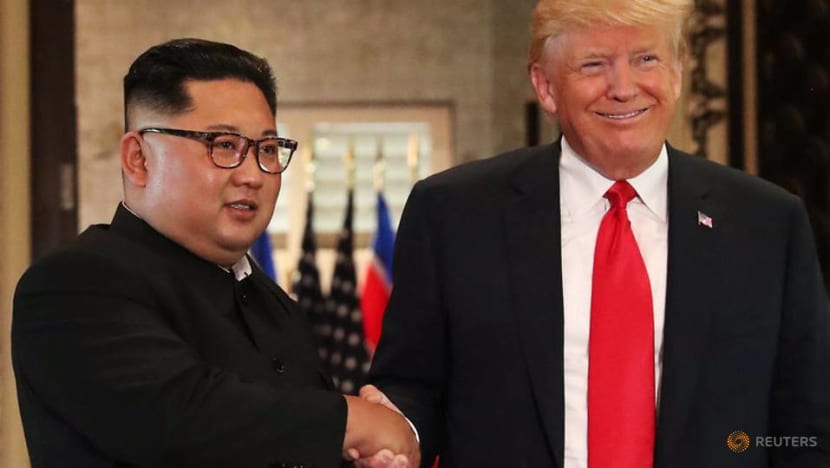commentary Commentary
Commentary: US-North Korea summit ends without marquee achievement, but wasn't a waste

U.S. President Donald Trump and North Korea's leader Kim Jong Un shake hands after signing documents during a summit at the Capella Hotel on the resort island of Sentosa, Singapore June 12, 2018. REUTERS/Jonathan Ernst
SINGAPORE: The most exciting part of the Singapore Summit between President Donald Trump and President Kim Jong Un came before the official proceedings had started.
The night before his meetings with the American leader, North Korea's Kim took an impromptu stroll outdoors, taking in the some of the sights including Gardens by the Bay and Marina Bay Sands integrated resort.
In recent months, Kim has been working to depict himself more as a conventional statesman who does normal things like travel abroad for meetings, and less like a dictator who prefers to remain secluded in his totalitarian state.
The rest of his visit followed a predictable script, and the first-ever summit between the two countries ended with an agreement its signees may like to describe as “historic,” but is really nothing new.
Despite hand-wringing by many critics over Trump’s inability to procure a serious commitment to denuclearisation from North Korea, the summit nevertheless represents progress, and both leaders deserve credit for pulling off what none of their predecessors ever managed to.
The day started with Trump and Kim smiling and shaking hands, with Trump saying the day’s proceedings would herald the start of a “terrific relationship,” in what amounted to a public show of camaraderie between two men whose previous contact had mostly been insults traded through the media.
After closed-door meetings where the two leaders spoke in the company of only their interpreters, they emerged to sign a joint statement, the contents of which provide some clue as to how contact between the two countries could proceed in the foreseeable future.
As many pundits quickly pointed out, that statement is full of watery, non-committal language. The body of the agreement is four points: forming new U.S.-North Korea relations, making efforts toward peace on the Korean peninsula, reaffirming the agreement that come out of April’s inter-Korean summit, and recovering and repatriating Korean War remains.
It doesn’t take a hardened skeptic to note the lack of specifics. First, a more tangible goal would have been to establish formal diplomatic relations, with embassies in Washington and Pyongyang. That would provide a real framework for cooperation.
“Efforts toward peace” could mean any number of things; while Trump did say in a post-summit press conference that U.S. military exercises in South Korea would be stopped, those war games have been going on for many years and cannot be called off at a moment’s notice. Also, there was no mention of formally ending the Korean War.
The language was also vague in the part that says the U.S. will provide North Korea with “security guarantees.” There is no elaboration on what those guarantees entail or how they would be implemented. Does this amount to a promise that the U.S. will not invade North Korea?
To sum up, the statement is vague to the point that it is almost meaningless. Neither side leaves Singapore with any real obligation to follow through on specific pledges, and North Korea is still in possession of just as many nuclear weapons as it was before the summit.
But that doesn’t mean the whole affair was a waste, or ‘nothing more than a photo op’ as it has been dismissively described.
Coming into the summit, some commentators argued that Trump was setting himself up to be played, that North Korea was unlikely to commit to what is known as complete, verifiable, irreversible denuclearisation, and that without such a pledge, the summit would be a sham that would only work to legitimise a dictatorship.
The fact is that getting Kim, at his first meeting with Trump, to unequivocally commit to giving up his nukes would have been a wholly unrealistic goal, and an ice-breaking meeting like this was necessary to ever make that possible.
The agreement is imprecise, but it does include a pledge for the two sides to hold follow-up negotiations by U.S. Secretary of State Mike Pompeo and a North Korean official. With any luck, those meetings can be a chance to iron out details.
If one has to pick a winner, Kim has come out on top here, having scored both a pledged security guarantee and a halt to U.S.-South Korea military drills.
But the real winner is anyone who lives in or cares about Korea. Having these two men meet for meetings on neutral ground and sign agreements - however vague - is vastly preferable to the talk of war that was on everyone’s lips in this part of the world just several months ago.
Even one year ago, no one would have imagined Kim Jong Un leisurely strolling around a major international city, admirably taking in the achievements of a country with a free market economy, or becoming the first North Korean leader to shake hands with a sitting U.S. president.
Peace isn’t here yet, but this summit brings us one step closer to it. For that, it should be welcomed.
Steven Borowiec is the politics editor of Korea Expose.














